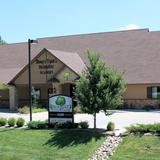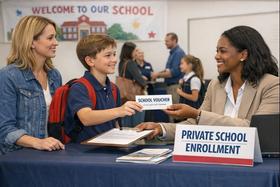Rolph Literacy Academy (RLA) is a unique school for children ages 5-10 with dyslexia or other reading challenges, offering more than just support in reading, writing, and spelling.
Students enjoy a full curriculum with multisensory teaching tailored to dyslexic learners, emphasizing STEM and the arts.
At RLA, students also learn through the Alphabetic Phonics program-a proven, research-based method for teaching reading to children with dyslexia.
With a small, one-to-four teacher-to-student ratio in language arts, RLA classrooms are unlike traditional ones; students engage in hands-on, creative activities designed for unique learning styles.
This approach not only builds skills but also helps children discover their strengths, or as we call them, their "superpowers".
Children who may struggle with reading confidence often thrive at RLA. As one of our student's mothers shared, her son's excitement was evident from his first day at school.
Quick Facts (2026)
- School Type: School with Special Program Emphasis
- Grades: Kindergarten-5
- Enrollment: 70 students
- Yearly Tuition: $14,000
- Acceptance rate: 80%
- Average class size: 4 students
- Application Deadline: Aug. 1
- Source: Verified school update
Top Rankings
Rolph Literacy Academy ranks among the top 20% of private schools in Kansas for:
Category
Attribute
School Overview
School Type
Religious Affiliation
Grades Offered
Grades Kindergarten-5
ADD/ADHD Support
Yes
Learning Difference Programs
Yes
Learning Programs Supported
dyslexia, reading difficulties
Year Founded
2014
Summer School Offered
Yes
School Calendar
Student Body
Total Students
70 students
Student Body Type
Co-ed
% Students of Color
91%
State avg.: 24%
Academics and Faculty
Total Classroom Teachers
10 teachers
Student-Teacher Ratio
7:1
National avg.: 11:1
Average Class Size
4 students
Classroom Dress Code
Casual
Tuition and Acceptance Rate
Admission Deadline
Aug. 1
Yearly Tuition Cost
$14,000
Tuition Notes
Scholarships available.
Acceptance Rate
80%
National avg.: 82%
Admissions Director
Denice Kuhns
Application URL
School Notes
Hours: 8:20 AM - 3:20 PM
Rolph Literacy Academy (RLA) is a private, full-day school for children ages 5-10 with dyslexia or other reading challenges. At RLA, we use the Alphabetic Phonics (AP) program, a research-backed, proven approach that builds essential reading, writing, and spelling skills.
Opened in 2014, RLA aims to redefine literacy, including not just language but also the use of numbers, computers, and other tools for understanding and communication. Our students receive a comprehensive education, learning not only reading and writing but also math, science, social studies, physical education, music, drama, and art.
Our Approach: RLA specializes in teaching neurodiverse students according to how their brains work best. The Alphabetic Phonics program, rooted in the Orton-Gillingham approach, uses a multisensory method that engages visual, auditory, and kinesthetic learning. With small classes (four students per teacher), we provide each child with individualized attention.
As an intervention school, RLA tailors the duration of each student's enrollment based on their progress. Once students gain essential literacy skills, they are ready to transition to a traditional school setting.
Objectives of Rolph Literacy Academy:
Rolph Literacy Academy (RLA) is a private, full-day school for children ages 5-10 with dyslexia or other reading challenges. At RLA, we use the Alphabetic Phonics (AP) program, a research-backed, proven approach that builds essential reading, writing, and spelling skills.
Opened in 2014, RLA aims to redefine literacy, including not just language but also the use of numbers, computers, and other tools for understanding and communication. Our students receive a comprehensive education, learning not only reading and writing but also math, science, social studies, physical education, music, drama, and art.
Our Approach: RLA specializes in teaching neurodiverse students according to how their brains work best. The Alphabetic Phonics program, rooted in the Orton-Gillingham approach, uses a multisensory method that engages visual, auditory, and kinesthetic learning. With small classes (four students per teacher), we provide each child with individualized attention.
As an intervention school, RLA tailors the duration of each student's enrollment based on their progress. Once students gain essential literacy skills, they are ready to transition to a traditional school setting.
Objectives of Rolph Literacy Academy:
- Create an ideal educational environment for young children with dyslexia that includes balanced remediation and a rich curriculum.
- Identify and nurture each child's strengths and talents while focusing on reading and literacy.
- Use hands-on, experiential learning to improve literacy while expanding skills in math, science, the arts, social studies, and leadership.
- Provide a specialized educational choice for students and families.
- Maintain a state-of-the-art training facility for teachers in literacy remediation. Develop a "state-of-the-science" literacy program in Wichita, Kansas, that raises awareness and provides education about dyslexia, with our mission: "All Kids Reading - All Kids Succeeding".
- Successfully transition students who have received early intervention back into parochial, public, or private schools.
Source: Verified school update
Frequently Asked Questions
How much does Rolph Literacy Academy cost?
Rolph Literacy Academy's tuition is approximately $14,000 for private students.
What is the acceptance rate of Rolph Literacy Academy?
The acceptance rate of Rolph Literacy Academy is 80%, which is lower than the national average of 81%.
When is the application deadline for Rolph Literacy Academy?
The application deadline for Rolph Literacy Academy is Aug. 1.
In what neighborhood is Rolph Literacy Academy located?
Rolph Literacy Academy is located in the Northeast Millair neighborhood of Wichita, KS.
School Reviews
Endorse Rolph Literacy Academy. Endorsements should be a few sentences in length. Please include any comments on:
- Quality of academic programs, teachers, and facilities
- Availability of music, art, sports and other extracurricular activities
- Academic or athletic awards
Recent Articles

A Parent’s Guide to 2026 High School Teaching Methods
Explore 2026 high school teaching methods, from AI integration to project-based learning, and what they mean for your teen’s success.

10 Misconceptions About Private Schools in 2026
Discover the top misconceptions about private schools in 2026, including cost, diversity, academics, and admissions realities.

Private Schools & Sustainability in 2026
Explore how private schools are advancing sustainability in 2026 through green campuses, eco-curriculum, and climate leadership initiatives.






